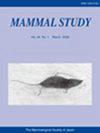视频陷阱能可靠地检测动物吗?对未经个体识别的动物密度估计的启示
IF 0.8
4区 生物学
Q3 ZOOLOGY
引用次数: 4
摘要
摘要最近已经开发了几种统计模型,在没有个体动物识别的情况下使用相机捕捉来估计动物密度。然而,大多数模型认为,通过相机捕捉器对经过相机视图特定区域的动物的检测是完美的。最近开发的REST模型(Nakashima等人,2018;《应用生态学杂志》55:735-744)也取决于特定区域内的捕获率和停留时间。我们在日本的一个城市公园里用一只家狗进行了一项实验试验,测试了商业相机陷阱是否能提供对这些参数的无偏估计。此外,我们使用Bushnell相机测试了相机角度对这些参数估计的影响。布什内尔的摄像机96%的时间都捕捉到了这只狗,而Acorn中尉的摄像机则错过了它大约一半的传球。使用Bushnell相机低估了4%的停留时间,使用Ltl Acorn相机高估了25%。使用Bushnell相机进行密度估计时的偏差小于10%。相机角度不影响检测概率,而向下角度的相机由于延迟触发而低估了停留时间。我们希望与制造商分享结果,使相机陷阱更适合动物密度估计。本文章由计算机程序翻译,如有差异,请以英文原文为准。
Can Video Traps Reliably Detect Animals? Implications for the Density Estimation of Animals without Individual Recognition
Abstract. Several statistical models have recently been developed to estimate animal density using camera trappings without individual animal recognition. However, most models assume that detection by camera traps of animals passing a specific area of the camera view is perfect. A recently developed REST model (Nakashima et al. 2018; Journal of Applied Ecology 55: 735–744) also depends on the trapping rates and staying times within a specific area. We tested whether commercial camera traps provided unbiased estimates of these parameters by conducting an experimental trial using a domestic dog in a city park in Japan. Additionally, we tested the effects of camera angle on the estimation of these parameters using the Bushnell camera. The Bushnell camera captured the dog 96% of the time, while the Ltl-Acorn camera missed about half of his passes. The staying time was underestimated by 4% using the Bushnell and overestimated by 25% using the Ltl-Acorn camera. The bias in density estimation was < 10% using the Bushnell camera. Camera angle did not affect detection probability, while the downward-angled cameras underestimated staying time due to the delayed trigger. We hope to share the results with manufacturers to make camera traps more suitable for animal density estimation.
求助全文
通过发布文献求助,成功后即可免费获取论文全文。
去求助
来源期刊

Mammal Study
ZOOLOGY-
CiteScore
1.70
自引率
20.00%
发文量
23
审稿时长
>12 weeks
期刊介绍:
Mammal Study is the official journal of the Mammal Society of Japan. It publishes original articles, short communications, and reviews on all aspects of mammalogy quarterly, written in English.
 求助内容:
求助内容: 应助结果提醒方式:
应助结果提醒方式:


